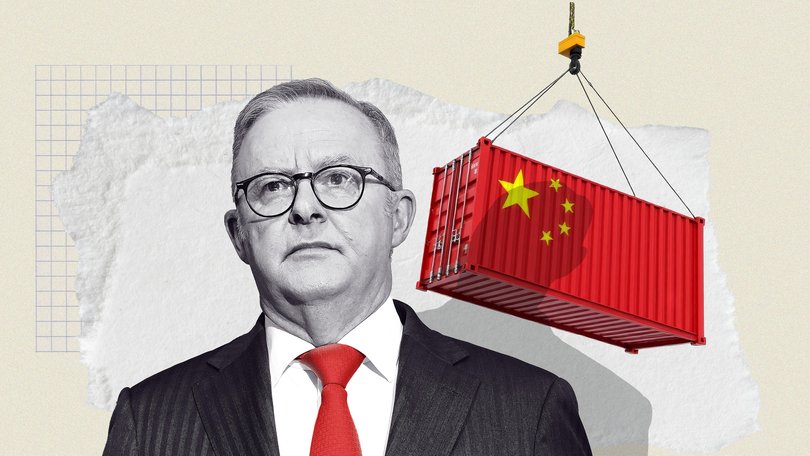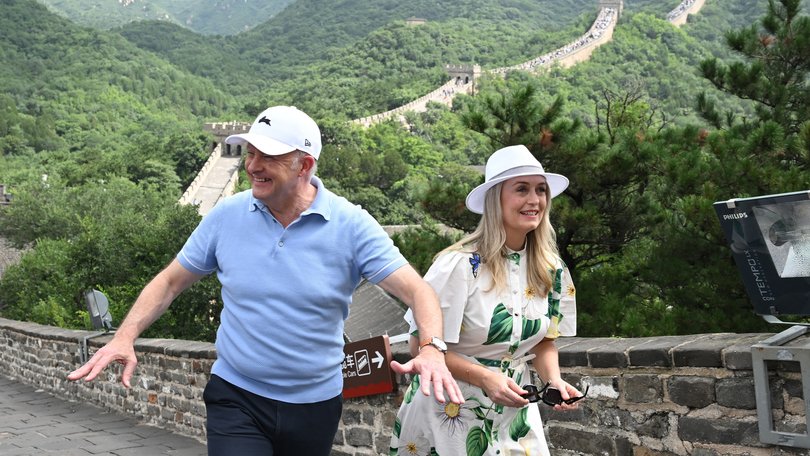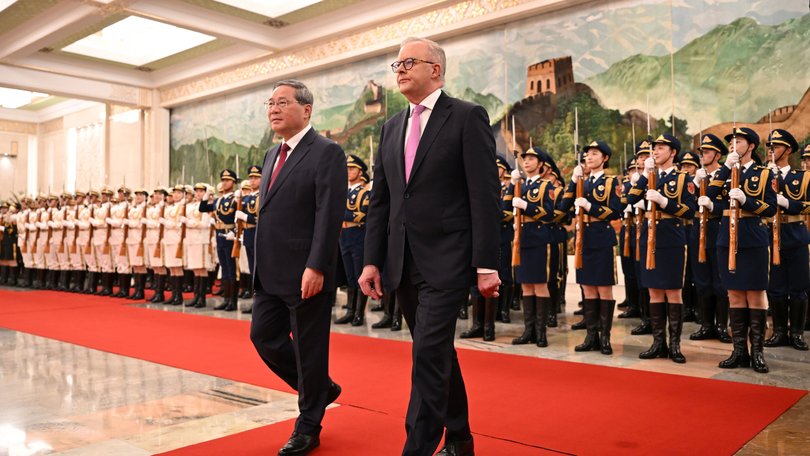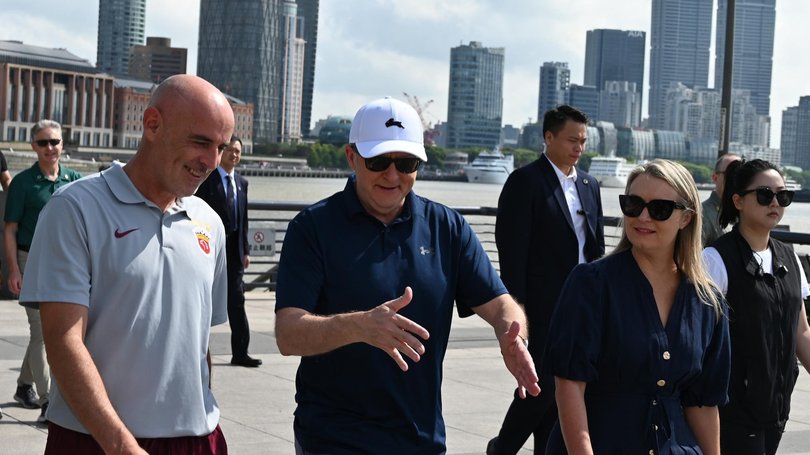NICOLA SMITH: Anthony Albanese’s trip has reached overkill, with no sign of standing up to China on big issues
NICOLA SMITH: The PM’s China visit was billed as a tightrope between boosting trade ties and raising defence concerns — but the PM is off balance.

Anthony Albanese is correct to stress the link between deeper economic cooperation with China and maintaining regional peace and stability.
He also rightly emphasises investment in “people to people” ties and trusted personal political relationships as a deescalation strategy to navigate global tensions.
But at the halfway mark on his unusually long six-day trip to China, he has made these points adequately and is now at risk of neglecting the fraught security threats hovering over the bilateral relationship in favour of soft power overkill.
Sign up to The Nightly's newsletters.
Get the first look at the digital newspaper, curated daily stories and breaking headlines delivered to your inbox.
By continuing you agree to our Terms and Privacy Policy.After a schedule already packed with high-profile business forums, a pitch to Chinese tourists and a walk on Shanghai’s Bund with the city’s football team, an additional excursion to the Great Wall on Wednesday and further sports and panda engagements in Chengdu is out of kilter with the geopolitical environment.
China appears thrilled with Mr Albanese’s trip so far, with effusive reports in state media complementing glowing statements from the top leadership of the ruling Communist Party about relations turning a corner into a bright new future.

The three-city tour of Shanghai, Beijing and Chengdu, was praised by influential state media masthead, the China Daily, as “notably long,” while the Global Times attempted to stoke political egos by comparing the Government favourably with the Morrison administration.
“Compared with the “minefields” status . . . three years ago, today’s China-Australia relationship is like a plane flying in the “stratosphere” after passing through the storm zone, and the most turbulent and bumpy period has passed,” said an editorial after Mr Albanese met China’s top brass and was offered a rare lunch invitation with President Xi.
The editorial ran next to an unsubtle cartoon of a panda in a smart suit and a malnourished, startled-looking kangaroo standing at a crossroads with a sign pointing towards “cooperation.”
China knows it has the upper hand in an economic relationship where one in four Australian jobs depend on trade.
The country’s Premier Li Qiang rammed home the point with gleeful flair on Tuesday, in a lengthy speech to Mr Albanese and Australian and Chinese industry chiefs.
“When every Chinese (person) eats more lobsters then Australia will not be able to meet the demands, because any small number multiplied by 1.4 billion people will be a huge number,” he said, alluding to the recently lifted Chinese ban on Australian seafood imports imposed during a diplomatic nadir.
The Premier tapped into a repetitive undercurrent of the visit to exploit Australian unease over the unpredictable tariff regime emerging from the United States, while touting China as a reliable economic partner and champion of free trade.
“We hope that you will embrace openness and cooperation no matter how the world changes,” he said. “We should be promoters of economic and trade cooperation so that our two countries will better draw each other’s strengths and growth together.”
The Albanese Government deserves credit for restoring economic ties after a turbulent period of punishing import bans on Australian commodities. It is true that there is scope for much broader and stabilising trade and business cooperation.

But on a trip that was billed as a tightrope walk between fostering economic growth and standing up to China’s alarming military and territorial ambitions, the Prime Minister is tipping off balance.
Mr Albanese gave little away on Tuesday over his talks with President Xi on military drills and possible future conflict over Taiwan — a strategic risk for the entire Indo-Pacific — but Beijing is already pushing the boundaries of its own narrative on regional security.
“Albanese reaffirmed Australia’s commitment to the one-China policy and its opposition to ‘Taiwan independence’,” said an official Chinese readout of the Prime Minister’s high-stakes political meetings.
The statement intentionally muddies the waters.
Australia’s “one-China policy” is distinctive from Beijing’s “one China principle” as the former acknowledges the ruling Communist Party’s position that Taiwan is a province of the People’s Republic of China but does not go as far as recognising this view.
After similar opacity over a commentary in Australian media by Chinese Ambassador Xiao Qian earlier this year, the Department of Foreign Affairs and Trade was at pains to clarify that Australia has a “deep and productive unofficial relationship with Taiwan including trade and investment, education, tourism and people-to-people ties”.
Mr Albanese said he hadn’t seen the Chinese readout but stressed he had reiterated Australia’s “longstanding bipartisan position” that has supported the One China Policy.
“We support the status quo by definition. We don’t support any unilateral action on Taiwan. That’s been our position for a long period of time. Nothing’s different,” he said.
China, which clearly views Australia as an amiable trade partner to counter the United States, saw an opportunity in its own national security interests to shape public opinions on Taiwan and took it.
“DJ Albo”, as the PM is sometimes known, has been enamoured by Chinese hospitality and attention to detail in Beijing’s warm welcome, revealing his delight that the band at Tuesday’s banquet at the prestigious Great Hall of the People played Paul Kelly’s To Her Door and Midnight Oil’s Power and the Passion.

“Those gestures matter, respect matters between countries. I took that as being a very warm gesture indeed,” he said.
“The opportunity to sit down and have a meal and talk about personal issues, talk about things that aren’t necessarily heavily political, is a really important part of diplomacy,” he said.
Mr Albanese has deployed symbolic gestures himself, on Tuesday treading in the footsteps of former Labor leader Gough Whitlam, who took a stroll on the Great Wall before his move as Prime Minister to establish Australia’s relationship with the People’s Republic of China.
Whitlam’s “brave decision” had “expanded Australia’s horizons,” said Mr Albanese, while acknowledging the world was now different and leaders had to adjust.
In today’s world, China is not only an economic giant, but a formidable military power with territorial ambitions over strategic trade routes and a stated intention to use force if necessary to seize Taiwan — a move that would have a catastrophic fallout on the region.
After his two hour meeting with President Xi, Mr Albanese revealed no assurances over Chinese military intentions or unprecedented build-up, including the request to give Australia adequate notice for live-fire drills near its shores.
In a period of dangerous geopolitical churn, conveying the right perceptions to China and to Australia’s top national security ally the United States are key.
Mr Albanese’s six-day tour of mainly soft diplomacy is in danger of showing too much carrot and not enough stick.

